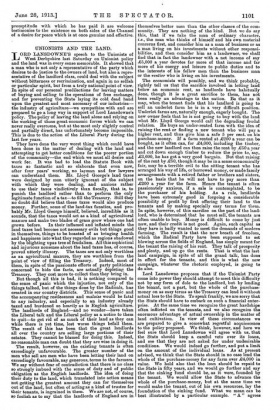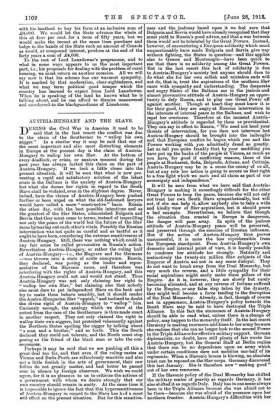UNIONISTS AND THE LAND.
TORD LANSDOWNE'S speech to the Unionists of 1 West Derbyshire last Saturday on Unionist policy and the land was in every sense memorable. It showed that a man who is not only a representative of the party which desires to do justice to the owners of land, but also a repre- sentative of the landlord class, could deal with the subject without bitterness or recrimination, and again in no selfish or particular spirit, but from a truly national point of view. In spite of our personal predilections for leaving matters of buying and selling to the operations of free exchange, and for preventing the State laying its cold dead hand upon the greatest and most necessary of our industries— the industry of agriculture—we sympathize with and are prepared to go a long way in support of Lord Lansdowne's policy. The policy of leaving the land alone and relying on the working of those great economic forces which we can never really overcome, but at the most only slightly control and partially direct, has unfortunately become impossible. This is due to the action of the Liberal Party during the last few years.
They have done the very worst thing which could have been done in the matter of dealing with the land and attempting to get better conditions for the poorer portion of the community—the end which we must all desire and work for. It was bad to load the Statute Book with taxes so fantastic and so elaborate that even now, after four years' working, no layman and few lawyers can understand them. Mr. Lloyd George's land. taxes were designed by men utterly ignorant of the subject with which they were dealing, and anxious rather to use their taxes vindictively than fiscally, that is, to punish the landlord rather than to perform the only legitimate function of a tax—to fill the Treasury. Still they no doubt did believe that these taxes would also produce money. Further, some of the land-tax fanatics, and pro- bably Mr. Lloyd George himself, believed, incredible as it sounds, that the taxes would act as a kind of agricultural manure and make two blades of grass grow where one had grown before. In their inflamed and inflated minds the land taxes had become not necessary evils but things good in themselves, things to be boasted of as bringing health and happiness into what they regarded as regions shadowed by the blighting upas tree of feudalism. All this sophistical and injurious nonsense about the land taxes has, of course, proved utterly illusory. The taxes are not only worthless as an agricultural manure, they are worthless from the point of view of filling the Treasury. Indeed, most of them, in spite of the passionate efforts of party politicians concerned to hide the facts, are actually depleting the Treasury. They cost more to collect than they bring in. But though all this is bad, it is nothing compared to the sense of panic which the injustice, not only of the things talked, but of the things done by the Radicals, has created in our country districts. This sense of panic and the accompanying restlessness and malaise would be fatal to any industry, and especially to an industry already taxed and burdened so heavily as is English agriculture. The landlords of England—and no wonder—have taken the Liberal talk and the Liberal policy as a notice to them to quit—to get rid of as much of their land as they can while there is yet time, lest worse things befall them. The result of this has been that the great landlords all over the country are selling large portions of their estates. They cannot be blamed for doing this. Indeed, no reasonable man can doubt that they are wise in doing it. The result, however, on the existing tenants is often exceedingly unfavourable. The greater number of the men who sell are men who have been letting their land on exceedingly favourable, nay generous, terms to the farmers. We say without fear of contradiction that there is no class so strongly imbued with the sense of duty and of public obligation as the English landlords. The idea of doing their duty to the land, which translated into action means not getting the greatest amount they can for themselves out of the land, but often of acting as a kind of trustee for their tenants, is ingrained in them. We are not, of course, so foolish as to say that the landlords of England are in themselves better men than the other classes of the com- munity. They are nothing of the kind. But we do say this, that if we take the man of ordinary character, i.e., the man who thinks of himself and his own material concerns first, and consider him as a man of business or as a man living on his investments without other responsi- bilities, and then consider him as a landowner, we shall find that in fact the landowner with a net income of say £5,000 a year devotes far more of that income and far more of his energy and leisure to public duties and to the interests of his fellow men than the business man or the rentier who is living on his investments.
The economists will possibly, and we think probably, rightly tell us that the sacrifice involved in letting land below an economic rent, as landlords have habitually done, though it is a great sacrifice to them, has not been really an advantage to the nation. Be that as it may, when the tenant finds that his landlord is going to sell an underlet farm he is in a very difficult position. Underlet farms are, naturally enough, eagerly bought. Tho new owner feels that he is not going to buy with the land what Mr. Lloyd George would call the degrading feudal relation. He buys an under-rented farm with the idea of raising the rent or finding a new tenant who will pay a higher rent, and thus give him a safe 5 per cent. on his purchase-money. If a, farm rented at £200 a year can be bought, as it often can, for £4,000, including the timber, and the new landlord can then raise the rent by £50 a year and cut down enough timber to reduce the price to, say, £3,600, he has got a very good bargain. But that raising of the rent by £50, though it may he in a sense economically fair, may be a terrible evil to the sitting tenant who has arranged his way of life, or borrowed money, or made family arrangements with a retired father or brothers and sisters, on the basis that he will not have to pay more than £200 a year for the farm. Hence the tenant is often passionately anxious, if a sale is contemplated, to be the purchaser of his holding. As a rule, landlords have been extremely good in forgoing a considerable possibility of profit by first offering their land to the tenants and by making specially easy terms for them. In spite, however, of this sacrifice on the part of the land- lord, who is determined that he must sell, the tenants are often unable to buy. Money is difficult to come by just now, and their credit is not good. Again, such capital as they have is badly wanted to meet the demands of modern farming. The result is that the new breath of freedom, which the Radical Party have been supposed to set blowing across the fields of England, has simply meant for the tenant the raising of his rent. They talk of prosperity and plenty, and up go the rents. That is what the last land campaign, in spite of all the grand talk, has done in effect for the tenants, and this is what the new campaign, whatever the rhetoric employed, is going to do also.
Lord. Lansdowne proposes that if the Unionist Party come into power they should attempt to meet this difficulty not by any form of dole to the landlord, but by lending the tenant, not a part, but the whole of the purchase- money on as easy terms as the Treasury can lend it without actual loss to the State. To speak frankly, we are sorry that the State should have to embark on such a financial enter- prise. At the same time we recognize the great hardships often inflicted on the tenants, and we also recognize the enormous advantage of actual ownership in the matter of land cultivation. In view of these circumstances we are prepared to give a somewhat regretful acquiescence to the policy proposed. We think, however, and here we feel sure that Lord Lansdowne will agree with us, that the State should keep a careful veto over its loans, and see that they are not asked for under undesirable conditions. We would indeed go further, and put a limit on the amount of the individual loans. As at present advised, we think that the State should in no case lend the whole of the purchase-money for any farm over £4,000 in value. We hold also that the loan should be repaid to the State in fifty years, and we would go further and say that the sinking fund should be, as it were, founded by the tenant. We would allow the State to advance the whole of the purchase-money, but at the same time we would make the tenant, out of his own resources, lay the foundation of the sinking fund. What we mean can be best illustrated by a particular example. " A " agrees with his landlord to buy his farm at an inclusive sum of £4,000. Wo would let the State advance the whole of this at four per cent. for a term of fifty years, but we would make the tenant at the same time purchase and lodge in the hands of the State such an amount of Consols as would, at compound interest, produce at the end of the forty years a sum of £4,000.
To the rest of Lord Lansdowne's programme, and to what in some ways appears to us the most important part, i.e., his proposals for dealing with the problem of rural housing, we must return on another occasion. All we will say now is that his scheme has our warmest sympathy. It is marked by that moderation, clear-sightedness, and what we may term political good temper which the country has learned to expect from Lord Lansdowne. When he is speaking of the land he knows what he is talking about, and he can afford to dismiss unanswered and unreferred-to the blackguardisms of Limehouse.



























































 Previous page
Previous page